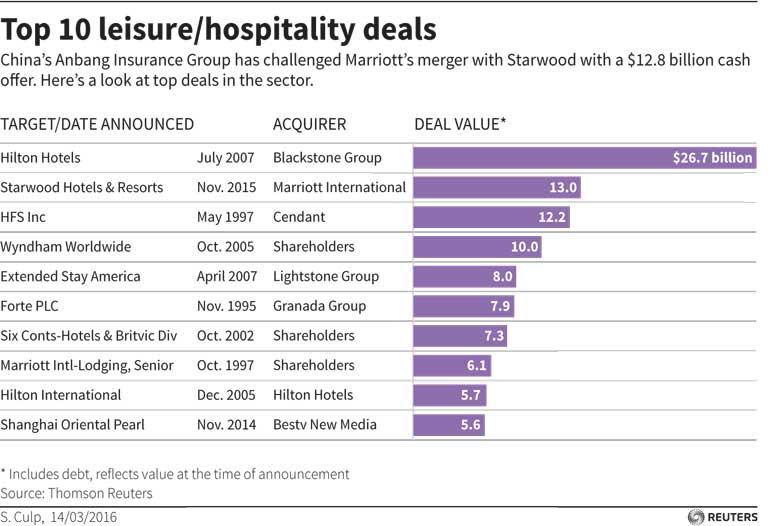Tuesday Feb 24, 2026
Tuesday Feb 24, 2026
Monday, 21 March 2016 00:00 - - {{hitsCtrl.values.hits}}
 Reuters: Starwood Hotels & Resorts Worldwide Inc (HOT.N) on Friday said a $13 billion cash offer from China’s Anbang Insurance Group Co was superior to one from Marriott International Inc (MAR.O), setting the stage for the largest-ever deal by a Chinese company in the United States.
Reuters: Starwood Hotels & Resorts Worldwide Inc (HOT.N) on Friday said a $13 billion cash offer from China’s Anbang Insurance Group Co was superior to one from Marriott International Inc (MAR.O), setting the stage for the largest-ever deal by a Chinese company in the United States.
The operator of Sheraton and Westin hotels said the Chinese insurer’s offer beat Marriott’s previously agreed cash and stock offer by nearly 15 % , and that it planned to scrap the proposed deal with the rival hotel chain.
Anbang has been on a U.S. hotel buying spree as Chinese insurers rush to acquire cash-generating assets as they struggle to keep up with the policy liabilities of the country’s ageing population. U.S. assets are also seen as a good hedge against weakness in the Chinese yuan currency.
The Anbang-led consortium - which also includes private equity firms J.C. Flowers & Co from the United States and Primavera Capital from China - has bid $78 per share in cash, or $13.16 billion overall, based on shares outstanding as of Feb. 19. Anbang’s bid is binding and fully financed, Starwood said.
At Thursday’s close, Marriott’s bid for Starwood was worth $68.06 per share, or around $11.5 billion overall.
Starwood will have to pay a $400 million breakup fee to Marriott if it walks away from their deal. Starwood’s shares were up 5 % at $80.20 in afternoon trading, their highest level since November.
Marriott, which has until 28 March to counter Anbang’s offer, said it was considering its options.
Dan Wasiolek, a hotel industry analyst at Morningstar, said Marriott could still counter with a higher offer.
“Marriott can increase their offer because they have the balance sheet flexibility,” he said, suggesting the larger rival hotel company could sweeten its offer by $700 million in cash.
If Anbang’s offer is successful, it would boost the company’s reputation as one of China’s top corporate acquirers, adding Starwood to its stable with its nearly 1,300 hotels in about 100 countries. Starwood brings with it several well-regarded hotel brands as well as a loyal business customer base.
The offer follows Anbang’s $6.5 billion deal struck last week for Strategic Hotels & Resorts Inc and its $2 billion purchase of New York’s iconic Waldorf Astoria hotel last year.
John Paulson, president of hedge fund Paulson & Co, Starwood’s largest shareholder, welcomed Anbang’s sweetened offer, saying it “better reflects the value of Starwood.” He called the Chinese company a “proven, sophisticated buyer of related assets.”
Beijing-based Anbang’s bid for Starwood epitomises its meteoric rise since it was founded in 2014 with an initial focus on car insurance.
Thanks to a spate of dealmaking at home and abroad, privately held Anbang now manages more than 1.9 trillion yuan ($292.3 billion) in assets, according to its website. Its chairman Wu Xiaohui married the granddaughter of former Chinese leader Deng Xiaoping.
REGULATORY REVIEW
A deal with Anbang would likely face a review by the U.S. Committee on Foreign Investment in the United States, an interagency panel that reviews deals to ensure they do not harm national security.
A CFIUS probe would take around 10 weeks and would focus on the proximity of Starwood’s several hundred U.S. hotels to critical facilities and the protection of customers’ privacy, such as credit card data and information that passes through hotel Wi-Fi, said a source close to the deal.
Anbang won approval to buy the Waldorf Astoria last year and to buy annuities and life insurer Fidelity & Guaranty Life just this week, giving it confidence that it can also win approval for the Starwood deal, the source said.
In 2012, CFIUS ordered the purchase of a wind farm in Oregon to be reversed because it was too close to a naval base.
Stephen Heifetz, a partner with law firm Steptoe & Johnson LLP, said this was unlikely in this case.
“I’d be surprised if there were any deal-killer for a large multi-property location,” he said, although he warned that the companies might have to make some concessions to get the deal through.
Other CFIUS experts have said previously that U.S. regulators might be concerned about a Starwood property, the W Hotel in downtown Washington, which overlooks the U.S. Treasury Department and the White House.
The U.S. government would also likely reconsider allowing some government officials to stay in the chain’s hotels, said Michael Wessel, a commissioner on Congress’s U.S.-China Economic and Security Review Commission.
“Anbang may have to requalify the chain for coverage under federal travel regulations,” he said. “If any individual properties posed a problem, one of the mitigation strategies could either be the sale of problem assets to another chain or potentially to limit reimbursement for government employees on government business at those properties.”
In either deal, Starwood shareholders will also receive stock in Interval Leisure Group Inc (IILG.O), which is buying Starwood’s vacation ownership business for about $5.67 per Starwood share.
Lazard and Citigroup Global Markets Inc are financial advisers to Starwood and Cravath, Swaine & Moore LLP is its legal counsel. PJT Partners Inc PJT.N is Anbang’s financial adviser, while Skadden, Arps, Slate, Meagher & Flom LLP is its legal counsel.